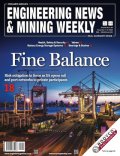New report sets stage for evidence-led municipal planning in Gauteng
The Gauteng provincial government, in partnership with multinational professional services firm Ernst & Young, has launched a new report offering a comprehensive analysis and projection of the socioeconomic conditions and trends across municipalities in the province.
The ‘Municipal Economic Review and Outlook (MERO)’, unveiled by Gauteng Finance and Economic Development MEC Lebogang Maile late last month, is expected to serve as an important instrument in shaping Gauteng’s development vision in the short, medium and long terms.
“Municipalities are crucial in South Africa for providing essential services, fostering economic development and ensuring democratic governance at the local level,” says Maile.
“They are the first point of contact for citizens regarding service delivery and local governance issues. For municipalities to plan and budget efficiently, credible data such as that provided by the MERO report must be available.”
The report provides a unique and comprehensive status update on the province, which allows for evidence-based planning, policymaking and budgeting.
“In examining prevailing global, national and provincial developments that are likely to shape the economic trajectory of Gauteng and its district, metropolitan and local municipalities, the MERO enables both the provincial and local governments to develop context-specific interventions needed to build stronger municipalities for a stronger nation and region.”
The report, set to be published on a yearly basis, leverages methodological triangulation, using both qualitative and quantitative data, as well as the use of several advanced data-collection methods, and delivers its findings in three sections: macroeconomic context and outlook, economic growth and employment, and safety and wellbeing.
The inaugural 2023/24 MERO report reveals that Gauteng’s economy continues to demonstrate resilience despite national challenges, with the Johannesburg, Tshwane and Ekurhuleni metropolitans driving recovery through their strong financial, manufacturing and logistics sectors.
However, the report highlights concerning disparities between urban and township economies, with smaller municipalities struggling with infrastructure backlogs and limited investment.
The report’s municipal financial health indicators reveal strain on service delivery capacity, while employment trends underscore persistent youth unemployment. It also identifies pressing infrastructure development needs, particularly in energy, healthcare and transport networks.
“In a province that is battling with crime, a crisis whose alleviation has been identified as a key priority for the provincial government, the MERO report’s comprehensive analysis of the safety and wellbeing [situation] in Gauteng is especially critical.”
The MERO report provides an overview of the health, safety and wellbeing situation in all district, metropolitan and local municipalities by examining socioeconomic indicators such as population statistics, poverty, inequality and unemployment, as well as health, education, access to housing, and crime.
Understanding these issues at a statistical level is important not only for government, but for the private sector and investors.
The report also unpacks important statistics for other government institutions, including the South African Revenue Service (Sars).
This includes GDP by region and jobs at a municipal level, which adds to the Sars spatial tax dataset, crucial for understanding and addressing economic and social challenges in South Africa.
A key finding from the report is the need to focus on data-driven decision-making at a local government level using targeted, relevant and recent data.
Data-driven decisions will allow local government officials to identify opportunities, such as well-performing sectors, improvements in service delivery, private and public sector investment and strategic infrastructure such as airports, besides others, that can be leveraged by municipalities, Maile comments.
The data assists in identifying areas of economic growth and decline, understanding the impact of economic shocks and informing policy decisions related to job creation, infrastructure development and service delivery.
Article Enquiry
Email Article
Save Article
Feedback
To advertise email advertising@creamermedia.co.za or click here
Press Office
Announcements
What's On
Subscribe to improve your user experience...
Option 1 (equivalent of R125 a month):
Receive a weekly copy of Creamer Media's Engineering News & Mining Weekly magazine
(print copy for those in South Africa and e-magazine for those outside of South Africa)
Receive daily email newsletters
Access to full search results
Access archive of magazine back copies
Access to Projects in Progress
Access to ONE Research Report of your choice in PDF format
Option 2 (equivalent of R375 a month):
All benefits from Option 1
PLUS
Access to Creamer Media's Research Channel Africa for ALL Research Reports, in PDF format, on various industrial and mining sectors
including Electricity; Water; Energy Transition; Hydrogen; Roads, Rail and Ports; Coal; Gold; Platinum; Battery Metals; etc.
Already a subscriber?
Forgotten your password?
Receive weekly copy of Creamer Media's Engineering News & Mining Weekly magazine (print copy for those in South Africa and e-magazine for those outside of South Africa)
➕
Recieve daily email newsletters
➕
Access to full search results
➕
Access archive of magazine back copies
➕
Access to Projects in Progress
➕
Access to ONE Research Report of your choice in PDF format
RESEARCH CHANNEL AFRICA
R4500 (equivalent of R375 a month)
SUBSCRIBEAll benefits from Option 1
➕
Access to Creamer Media's Research Channel Africa for ALL Research Reports on various industrial and mining sectors, in PDF format, including on:
Electricity
➕
Water
➕
Energy Transition
➕
Hydrogen
➕
Roads, Rail and Ports
➕
Coal
➕
Gold
➕
Platinum
➕
Battery Metals
➕
etc.
Receive all benefits from Option 1 or Option 2 delivered to numerous people at your company
➕
Multiple User names and Passwords for simultaneous log-ins
➕
Intranet integration access to all in your organisation

















